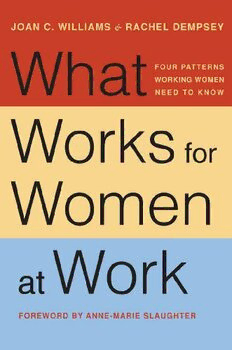
What Works for Women at Work: Four Patterns Working Women Need to Know PDF
Preview What Works for Women at Work: Four Patterns Working Women Need to Know
What Works for Women at Work This page intentionally left blank What Works for Women at Work Four Patterns Working Women Need to Know Joan C. Williams and Rachel Dempsey FoReWoRD by Anne-MARie SlAughteR a neW yoRK uniVeRSity PReSS New York and London A New Girls’ Network Book neW yoRK uniVeRSity PReSS new york and london www.nyupress.org © 2014 by Joan C. Williams and Rachel Dempsey All rights reserved the information provided in this book is intended for educational and informational purposes only and not for the purpose of providing legal advice. nothing contained in this book is to be considered as the rendering of legal advice for specific cases, and readers are responsible for obtaining such advice from their own legal counsel. Any resources, web links, or other external materials referenced in this book are not specifically endorsed by the author, and are provided only as a source of information. References to internet websites (uRls) were accurate at the time of writing. neither the author nor new york university Press is responsible for uRls that may have expired or changed since the manuscript was prepared. library of Congress Cataloging-in-Publication Data Wiilliams, Joan, 1952 – What works for women at work : four patterns working women need to know / Joan C. Williams, Rachel Dempsey ; [foreword by] Anne-Marie Slaughter. p. cm. includes bibliographical references and index. iSbn 978-1-4798-3545-4 (hardback) 1. Women — employment. 2. Women — Psychology. 3. Sex role in the work environment. i. Dempsey, Rachel. ii. title. hD6053.W477 2014 650.1'3082 — d c23 2013029819 new york university Press books are printed on acid-free paper, and their binding materials are chosen for strength and durability. We strive to use environmentally responsible suppliers and materials to the greatest extent possible in publishing our books. Manufactured in the united States of America 10 9 8 7 6 5 4 3 2 1 Also available as an ebook Dedicated to the Wise Women, without whom we could not have written this book, in friendship and with gratitude: Kara Baysinger Mika Mayer Alex Buck Michele Coleman Mayes Kirby Chown Laura McMahon Mary Cranston Sharon Meers Kathryn Burkett Dickson Leslie Morgan Steiner Karen Edson Vernaˉ Myers Joan Haratani Sandra Pierce Alison Hooker Marci Rubin Susan Klooz Carol Sabransky Catherine Lamboley Laura Stein Roberta Liebenberg Phyllis Stewart Pires Karen Lockwood Sally Thornton This page intentionally left blank The authors gratefully acknowledge the generous support of the National Science Foundation (NSF ) ADVANCE PAID grant no. EHR 1106411, which funded the research reflected in chapter 11 of this work. Somewhat different versions of chapter 11 have been published as a report of the Center for WorkLife Law and as an article in the harvard Journal of law and gender. This page intentionally left blank the women who were interviewed for this book represent a wide range of ages, ethnicities, and backgrounds. Joan C. Williams inter- viewed 67 women for the new girls’ network. these women were roughly 40 to 60 years of age and at the top of their fields. they worked in business, medicine, academia, government, and the legal profession. three ran their own businesses. eleven identi- fied themselves as women of color, specifically as black (or African American), latina, and Asian (or Asian American). the interviews were conducted over the phone between June 2, 2010, and novem- ber 6, 2012. For the national Science Foundation Project, 60 women-of-color scientists were interviewed by erika V. hall, a PhD candidate at the Kellogg School of Management at northwestern university. the scientists interviewed represent a variety of scientific disci- plines. Most of the women worked in academic settings. they are identified as black (or African American), latina, and Asian (or Asian American). these women were roughly 30 to 60 years of age. the interviews were conducted over the phone between June 4, 2012, and october 5, 2012.
